HOLLYWOOD, Fla., — Oct. 31, 2017 — On Oct. 28, Lanetta Bronté-Hall, MD, MPH, MSPH presented a positive results case study for a sickle cell patient with severe and symptomatic anemia, after receiving voxelotor, at the 45th Annual National Convention hosted by the Sickle Cell Disease Association of America in Atlanta.
Dr Bronté-Hall, president and founder of the Foundation for Sickle Cell Disease Research (FSCDR), is thankful that FSCDR’s patient was able to receive voxelotor through single-patient compassionate access. She’s hopeful to see continued positive results as more patients enroll into Global Blood Therapeutics, Inc’s (GBT) Phase 3 HOPE study.
Dr Bronté-Hall presented on Juan E. Caballero, a 67-year old male with the HbSS sickle cell genotype with severe anemia refractory to transfusions due to red cell antibodies that developed after receiving multiple blood transfusions. He also had moderate chronic obstructive pulmonary disease (COPD) that required supplemental oxygen therapy, recurrent and frequent pain exacerbations, extreme fatigue and clinical depression. Caballero was ineligible to participate in GBT’s Phase 3 HOPE study of voxelotor because of these circumstances, but was able to receive the drug through compassionate access.
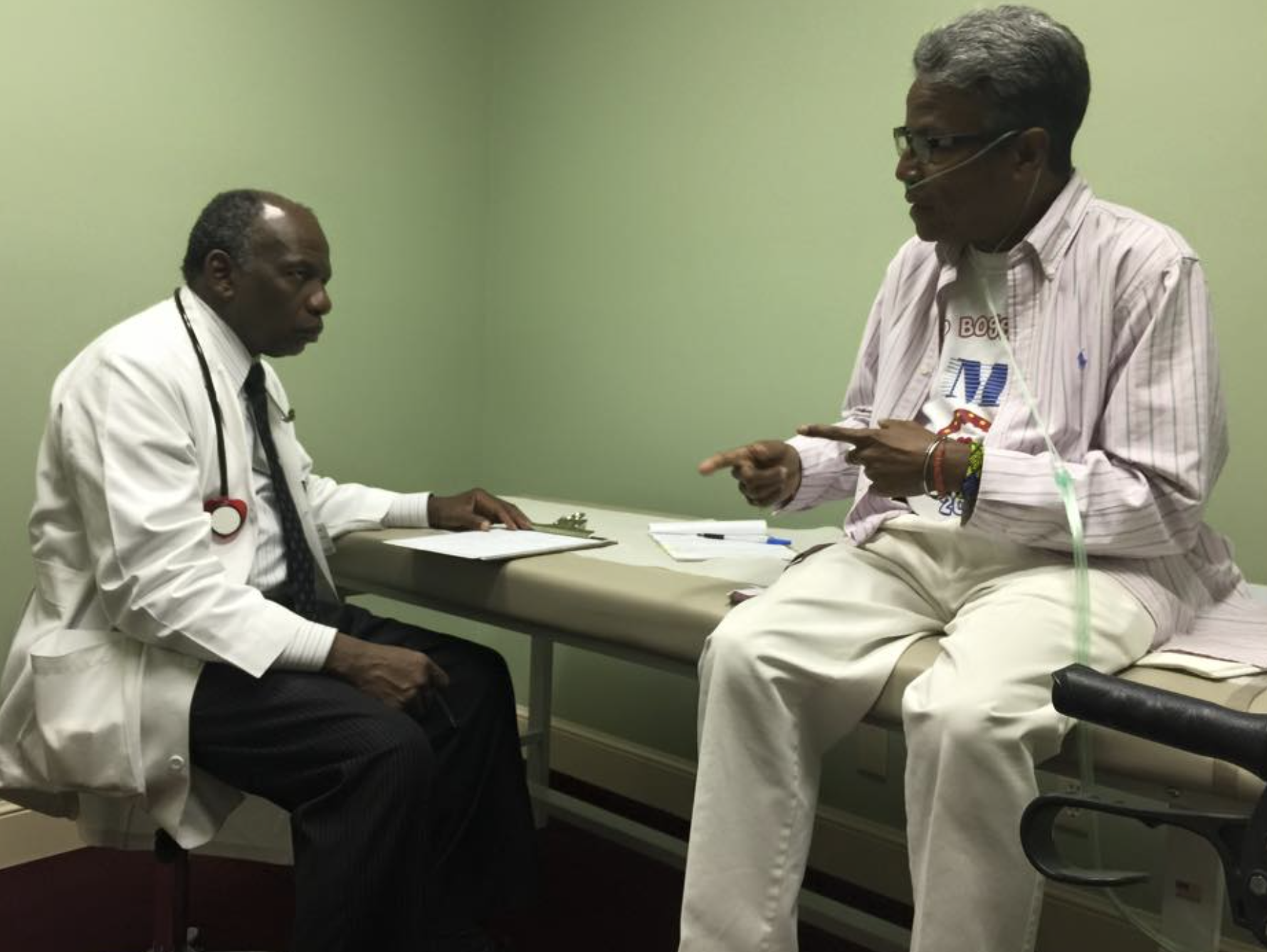
Juan Caballero (right) sits in triage and speaks with FSCDR’s Hematologist, Dr. Gershwin Blyden (left). Mr. Caballero was fully dependent on oxygen at the time and had to use an oxygen tank 24/7. This photo was taken February 27, 2015.
Today (April 2023), he’s 72 years old with HbSS sickle cell genotype. In 2017, at age 67, he was receiving voxelotor, an investigational drug created by Global Blood Therapeutics, Inc., through single-patient compassionate access.
After receiving voxelotor 900 mg orally, once daily, Caballero rapidly showed improvement in pain, fatigue and mental health (after one to two weeks). His hemoglobin levels rose quickly to approximately 1.5g/dL above baseline with a sustained increase over 66 weeks in range of 1 to 1.5g/dL. Reductions occurred in reticulocyte count (indicated increased production to replace damaged red blood cells) and bilirubin (a measure of red blood cell destruction) both consistent with diminished hemolysis.
Caballero’s blood oxygen saturation level improved on a standard walk test, from 86mmHg at baseline to 96mmHg at 65 weeks, after which he discontinued continuous oxygen supplementation. No hospitalization prompted by sickle cell pain has occurred since voxelotor initiation. His only treatment-related side effect, Grade 2 diarrhea, occurred nine weeks after beginning voxelotor treatment when the dose was increased to 1,500 mg daily. He dose returned to 900 mg and has had no further treatment-related side effects.
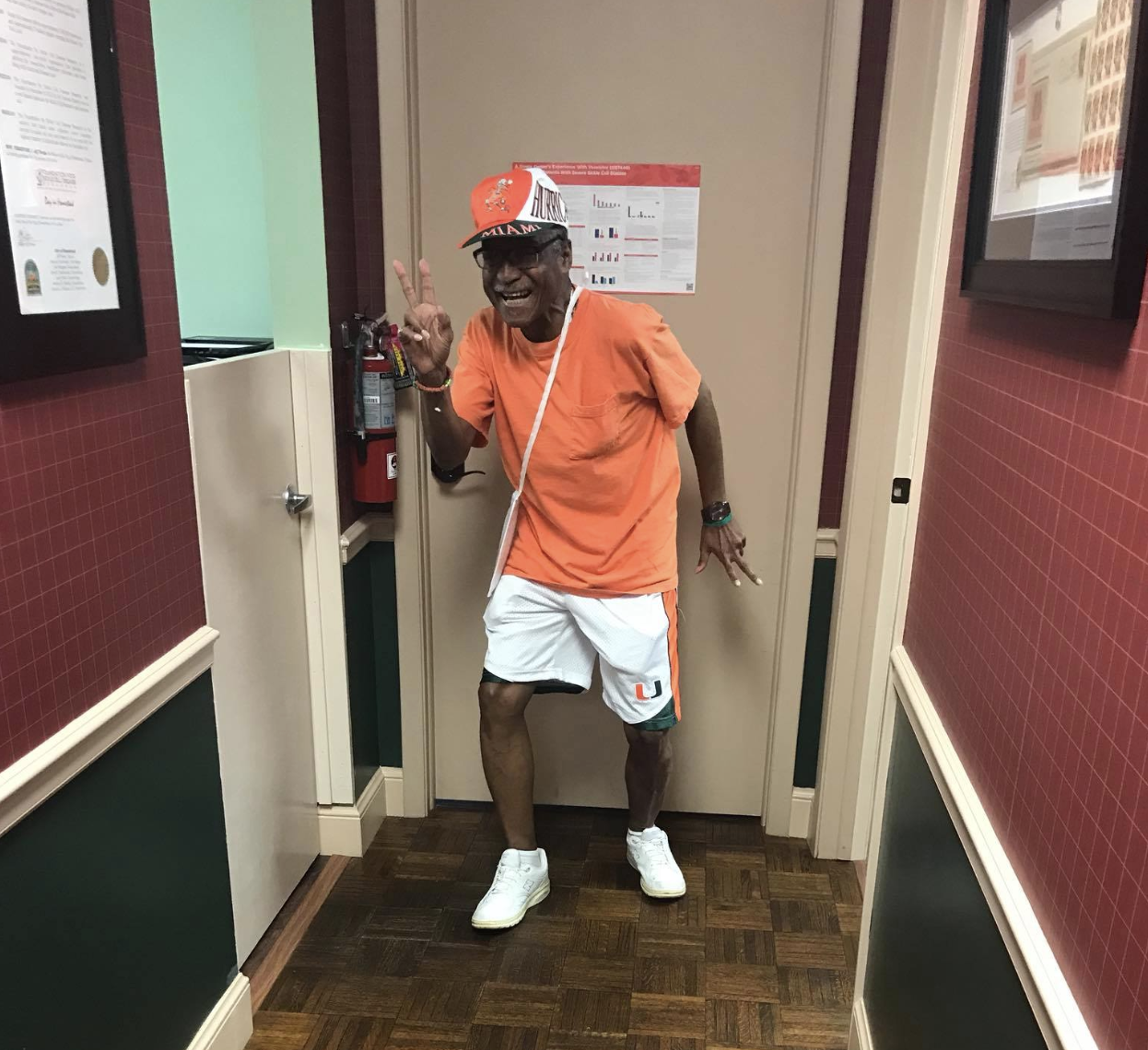
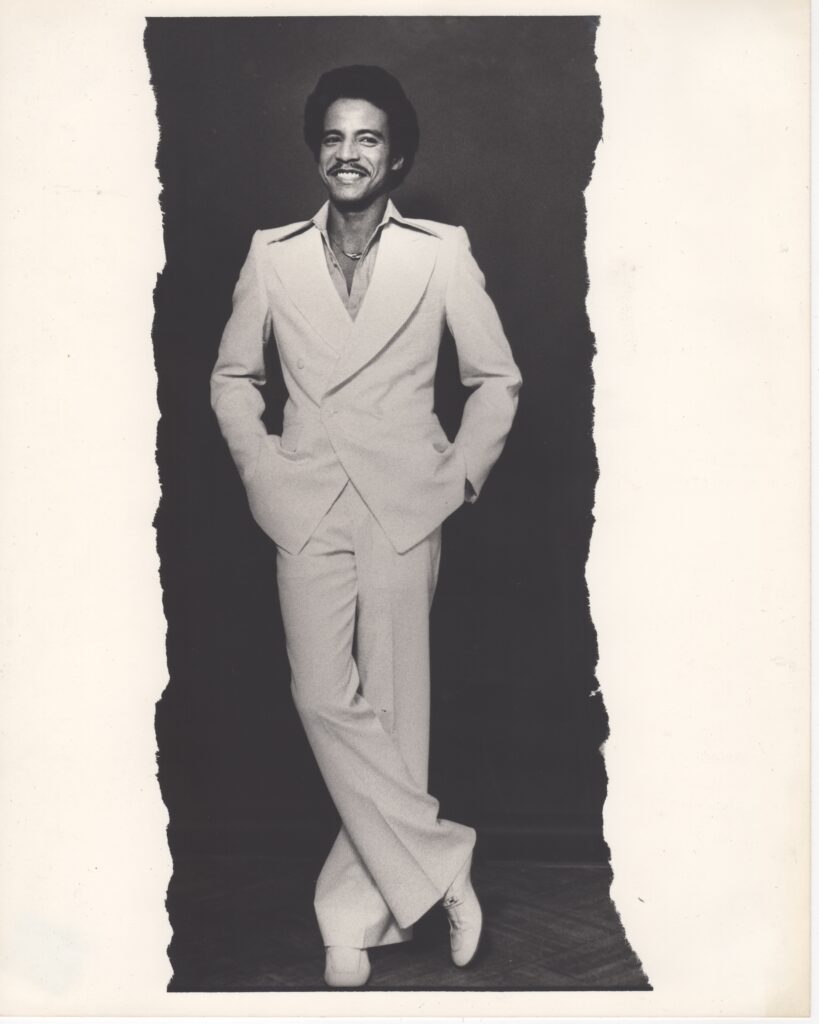
Juan Caballero in the 1970s.
Compassionate access is an option provided by the U.S. Food and Drug Administration (FDA) to make available, prior to regulatory approval, investigational medicines for the treatment of serious or life-threatening diseases or conditions for which there are no ongoing clinical trials and there is a lack of satisfactory therapeutic alternatives.
Caballero was presented with the opportunity to receive voxelotor through compassionate access by Dr Bronté-Hall and Dr. Gershwin Blyden at FSCDR.
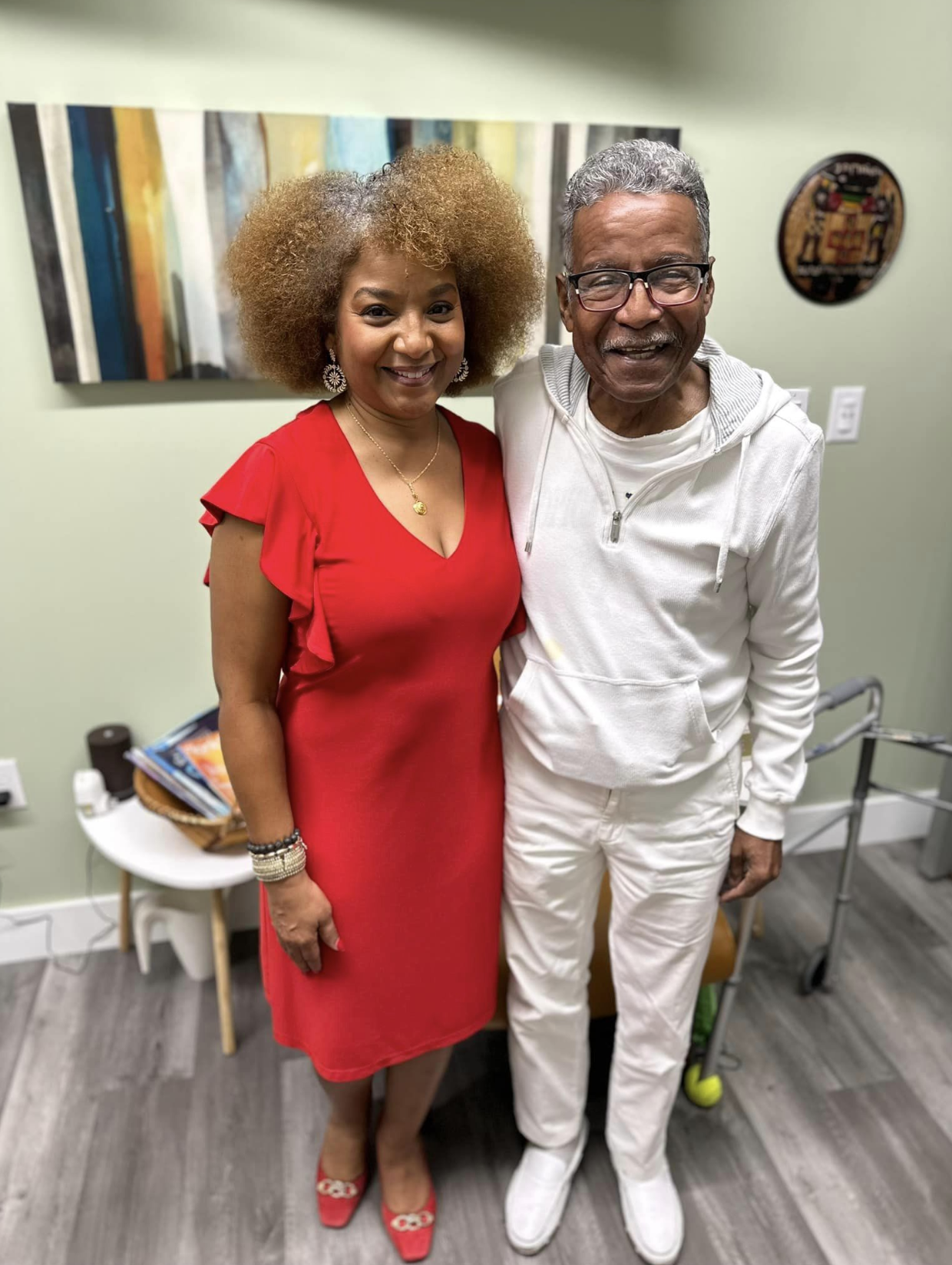
Dr. Bronté-Hall (Left) and Juan Caballero (Right) at FSCDR’s medical office on December 23, 2022.
Dr Bronté-Hall founded FSCDR in 2012 after noticing the extreme lack of care for a disease that affects three million individuals nationwide. In 2015, FSCDR opened the nation’s first standalone (not connected to hospitals or academic centers) outpatient center solely devoted to sickle cell care and services. This is historically significant to South Florida, where FSCDR’s headquarters site is located, as this community has one of the highest numbers in the U.S. of individuals affected by sickle cell, but did not have a center specifically made for sickle cell treatment.
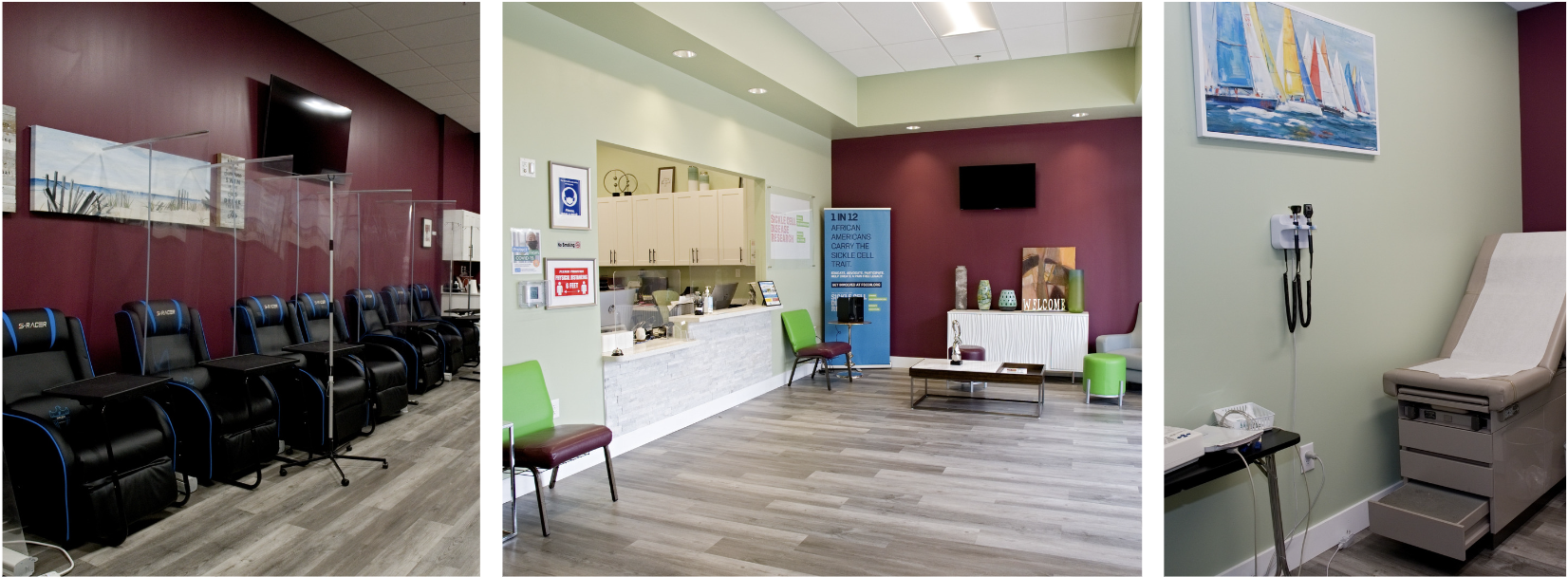
FSCDR Flagship Medical Office in Hollywood, FL.
FSCDR now has multiple locations in the State of Florida. FSCDR’s headquarters address is 1685 South State Road 7, Unit 4, Hollywood, FL 33023. To learn more about its innovate care and services, please visit www.fscdr.org, email [email protected] or call 954-397-3251. Also, follow FSCDR on Facebook @fscdr, Twitter at @Fundsicklecell and Instagram @fscdr.
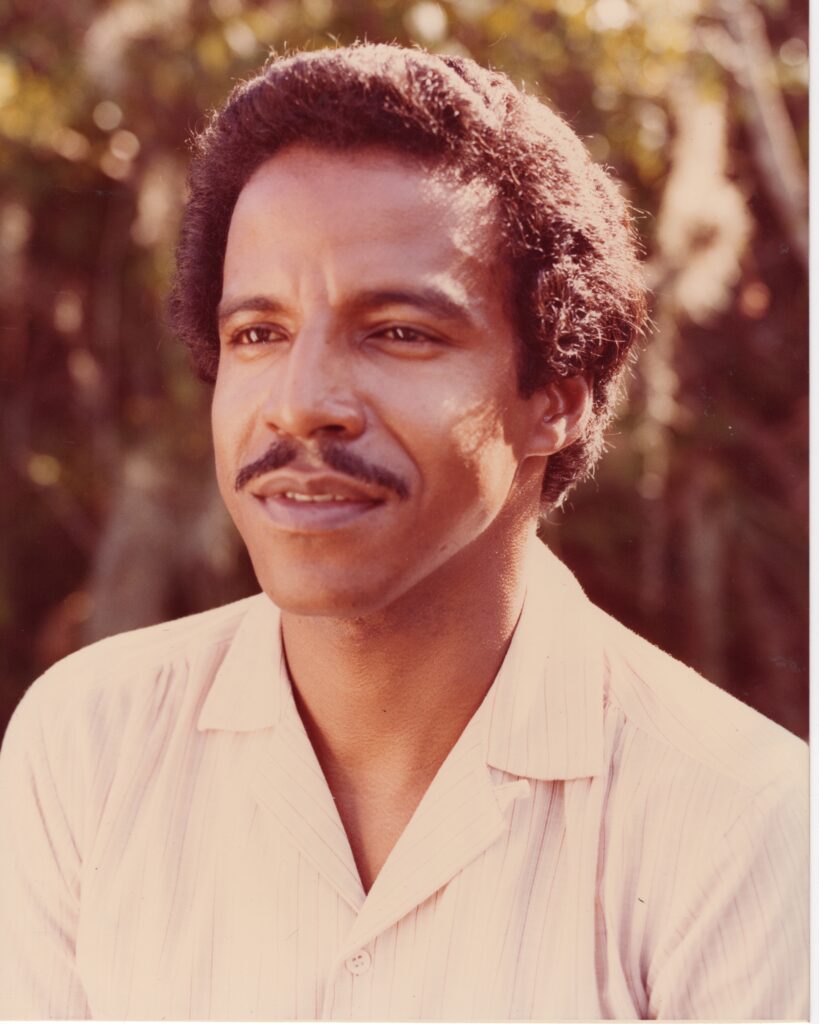
Juan Caballero in the 1970s. Today, he is thankful for voxelotor. As his conditioned worsened, he said he felt like a shell of a person. Now, he feels closer to “his old self.” As of April 5, 2023, Mr. Caballero is still alive and living well.
About Voxelotor in Sickle Cell Disease
This paragraph is as of October 31, 2017: Voxelotor (previously called GBT440) is being developed as an oral, once-daily therapy for patients with SCD. Voxelotor works by increasing hemoglobin’s affinity for oxygen. Since oxygenated sickle hemoglobin does not polymerize, GBT believes voxelotor blocks polymerization and the resultant sickling of red blood cells. With the potential to restore normal hemoglobin function and improve oxygen delivery, GBT believes that voxelotor may potentially modify the course of SCD. In recognition of the critical need for new SCD treatments, the U.S. Food and Drug Administration (FDA) has granted voxelotor Fast Track, Orphan Drug and Rare Pediatric Disease designations for the treatment of patients with SCD. The European Medicines Agency (EMA) has included voxelotor in its Priority Medicines (PRIME) program, and the European Commission (EC) has designated voxelotor as an orphan medicinal product for the treatment of patients with SCD.
This paragraph is as of October 31, 2017: GBT is currently evaluating voxelotor in the HOPE (Hemoglobin Oxygen Affinity Modulation to Inhibit HbS PolymErization) Study, a Phase 3 clinical trial in patients age 12 and older with SCD. Additionally, voxelotor is being studied in the ongoing Phase 1/2 GBT440-001 trial and in the ongoing Phase 2a HOPE-KIDS 1 Study, an open-label, single- and multiple-dose study in pediatric patients (and 6-17) with SCD. HOPE-KIDS 1 is assessing the safety, tolerability, pharmacokinetics and exploratory treatment effect of voxelotor.
Global Blood Therapeutics, Inc.
Global Blood Therapeutics, Inc. was a clinical-stage biopharmaceutical company dedicated to discovering, developing and commercializing novel therapeutics to treat grievous blood-based disorders with significant unmet need. As of April 2023, GBT was acquired by and now operates as Pfizer, Inc. Voxelotor is now approved by the FDA and is sold under the brand name, Oxbryta.
Statements made in this press release are based off data collected and provided by the Foundation for Sickle Cell Disease Research, or, are from Global Blood Therapeutics Inc.’s press release published Oct. 28, 2017. They are objective and intended to consciously inform the sickle cell community of possible treatment options in the future.
Contact Information:
Kyla Thorpe
Foundation for Sickle Cell Disease Research